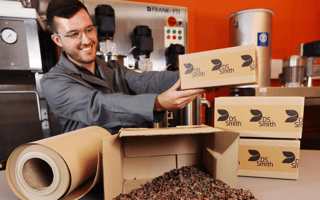Atlanta is home to a plethora of supply chain companies, making it a key player in the U.S. logistics industry. While names like Stord and UPS are focused on getting shipments from place to place, DS Smith is more concerned about how those shipments are packaged. The Atlanta company provides sustainable fiber-based packaging to companies around the world.
DS Smith began as a family box-making business back in the 1940s and has since grown into a packaging design and manufacturing company that offers paper-making and recycling services. The company owns 15 manufacturing, paper and recycling facilities in Atlanta that house more than 2,000 employees. Its global footprint spans 34 countries with a total team of 30,000 people, according to the company.
In the midst of this growth, DS Smith announced a $140 million investment in its research and development last year. Today, it gave a look into what kinds of innovations are in the works.
The company has been conducting trials that use more sustainable materials for packaging and cardboard fibers. These trials led DS Smith to develop eco-friendly alternatives to plastic-heavy packaging using things like daisies, straw, cocoa shells, miscanthus — also known as silvergrass — and seaweed.
“As a leader in sustainability, delivering real change is always top of mind. We know that producing recyclable paper-based options alone is not enough, and protecting natural resources is crucial to enabling sustainable development,” Allison Berg, sustainability manager at DS Smith, said in a statement. “By pursuing more renewable resources for packaging, we are seeking to actively reduce our use of finite natural resources and will continue to change packaging as we know it.”
The materials DS Smith has been working with each boast their own reasons as to why they’d make optimal packaging alternatives. Straw and miscanthus both require less energy and water than plastic when turning the materials into packaging. Additionally, miscanthus is abundant since it can grow in poor-quality soil and generate several crops a year, according to the company. While DS Smith is still looking into how quick-growing daisies might fare, the plant has shown signs of being able to produce high-quality fibers.
In terms of what’s proven to work well, DS Smith tested the use of seaweed fibers as a raw material for several types of packaging. Some of the applicable solutions include cartons, paper wraps and cardboard trays. The fibers’ barrier coating property made it a potential alternative for sealing food items rather than using plastics or petroleum-based packaging.
According to DS Smith, consumers have expressed environmental concerns that steer their shopping preferences. For instance, if a product’s package is well-marked as recyclable, they’re much more likely to purchase it, according to a recent company survey. Considering this data, DS Smith plans to manufacture 100 percent reusable or recyclable packaging by 2023. Its longer-term goal is that by 2030 all of its packaging will be recycled or reused.
As DS Smith continues its research, the company plans to optimize fiber use in all of its packaging solutions by 2025.




